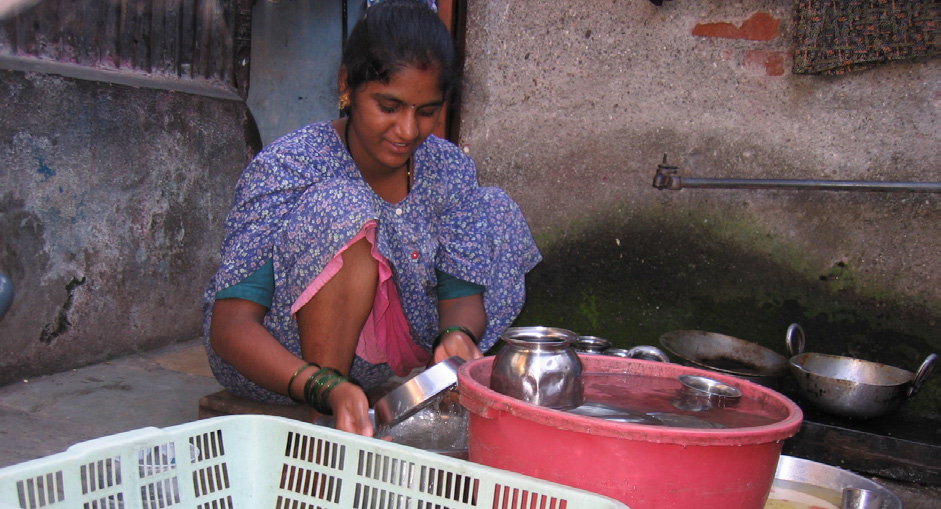Delhi domestic workers move Delhi High Court for compensation

Most middle class households employ domestic workers providing minimal wage to them (Photo: International Domestic Workers Federation)
A total of 471 domestic workers in Delhi have filed a writ petition in Delhi High Court seeking relief at par with that provided by the Delhi government to other informal sector workers like autorickshaw drivers and e-rickshaw drivers in the national capital. The workers, in their petition, say that they were denied all relief, even though they were one of the worst hit categories of informal sector when the central government imposed stringent lockdowns across India.
Domestic workers are one of the most pervasive groups of informal and unorganised workers in the country and can be found across the country, working in most middle and upper class urban households. In the absence of any official data, various estimates put the total number of domestic workers in India at nearly 5 million, though even these reports say this might be a severe underestimation. It was only in November 2021 that the central government moved to launch a nationwide survey on the number of people employed as domestic workers.
Despite being in every household of a certain economic level, the domestic workers have also remained one of the most invisible segments of workers in the country and hence most prone to exploitation and negligence. This was evident during the pandemic when most of the workers, mainly women, were locked up in their homes and hence lost their jobs or at least significant part of their income. And they were also left out of any organised relief distributed by central or state government.
This is the main contention in a writ petition was filed on behalf of 471 domestic workers that demanded compensation for government neglecting them during policymaking. Domestic workers, Ritu Joshi, Kiran, Lata, Annapurna Dass and Nilu, are the five main petitioners on behalf of the rest that have filed the petition against the Delhi government and its Labour Commissioner seeking relief of INR10,000 ex-gratia and free rations.
The petition says that a large number of policies have been adopted over the years to protect the rights of the working class, especially in the informal sector. However, domestic workers are largely excluded from protective labour legislation. In 2008, Unorganised Worker’s Social Security Act 2008, was adopted for ensuring social welfare is provided to the domestic workers. However, due to bureaucracy, the domestic workers are unable to avail the intended benefits of the act to a large extent, says the petition.
The petition claims that when the Covid-19 pandemic broke, a majority of domestic workers lost their jobs and incomes due to the social stigma of these workers being the carriers of coronavirus. “Approximately 90 pc of domestic workers in Delhi have lost their jobs during the 2nd wave of Covid-19 and the lockdown this year. Some domestic workers got back their jobs because household needed help in household chores due to having old and elderly or disabled members or having children in the family. Shockingly, even these households provide meagre salaries to their domestic worker at INR 100 on an average per day. Many domestic workers who used to work at 4 different households are now employed in only one,” says the petition.
Domestic workers uprooted from villages
“When most workers could choose to head back to their villages during the pandemic, domestic workers were deprived of that choice too. Unlike the migrant workers who have a foot in the village, domestic workers have been living in the cities for longer durations and feel a sense of semi-permanence. When the lockdown descended and continued, their estranged relations with the villages did not permit them to head back and find employment under MGNREGA or get involved in farming activities. This has, once again, raised the dire need for social security and protection for domestic workers,” says the petition that has been filed with the assistance of Human Right Law Network (HRLN), an NGO which provides free legal help to the underprivileged.
“This petition has been filed by five domestic workers and is representing almost 500 domestic workers in the city. This petition was filed during the peak of the Covid-19 wave in 2020, asking the court to give free ration to the domestic workers. They were, however, denied rations as they are not migrant workers and didn’t have rations cards. Apart from that these workers also didn’t have any incomes as they failed to find employment in households,” Joicy Milun and Amiy Shukla, advocates at HRLN representing the domestic workers tells Media India Group.
“We are demanding an ex-gratia amount of ₹10,000 and free rations for all the domestic workers residing in the state of Delhi upon producing Aadhar Card or other form of valid identity. We are demanding this from the Government of NCT Delhi and the Labour Commissioner. Earlier only the 5 petitioners were compensated with free rations and the government claimed that all the domestic workers received aid,” adds Milan and Shukla.
The lawyers and petitioners are also unhappy about the slow pace with which the case has progressed. “This trial has become very lengthy; I have asked the court to speed up the hearing because these workers have faced a lot of financial trouble. However, the court has given us the date for July 16,” says Milan.
Before filing the petition in the court HRLN conducted an independent survey asking the domestic workers about their economic conditions during the ongoing pandemic. “We conducted the survey during Covid times. We started asking questions to the domestic workers asking whether they received some aid or not. We found that people were not receiving rations, even the people who had ration cards were denied rations due to shortage. The workers who didn’t have ration cards applied for it however, their applications were rejected. Then finally we filed this petition with the court demanding compensation for the workers,” Nirmal Agni, member of HRLN who led the survey tells Media India Group.
Petition finds broad support
The petition and its main claims resonate with domestic workers throughout the capital, not just those who have filed the case. Shanti (name changed) is a domestic worker living in the Trilokpuri who works with some middle-class families in Mayur Vihar, Delhi. “During the lockdown, we had to face a lot of issues. We were asked by our employers to come even during the lockdowns. The Delhi Police were running their patrols and check, requesting people to stay at home, but still, we were forced to come and work. Some of the families whose member tested covid positive didn’t inform us on time and insisted that we come and work for them,” Shanti tells Media India Group.
Many such domestic workers like Shanti work in multiple households to make their ends meet. However, during lockdowns, the Residents’ Welfare Associations of various localities opposed the entry of the workers into the neighbourhoods. “Many of my employers also cut my pay by half or three-fourths during the lockdowns and some even refused to pay me saying I am not providing any service. I wanted to go and work but we were denied entry by the residents of the colonies. They said you work at multiple houses and might spread the virus in the locality. During those time, my husband was unemployed and with such little income, it became very hard for us to meet ends. We had to exhaust our savings in order to fill our stomachs during the pandemic,” adds Shanti.
“The government tried to help us and came up with schemes for the poor and gave us flour, wheat, sugar and rice during the pandemic. This was however only for the people who had their ration cards with them. Thankfully, I and my husband had our ration cards. A few of my friends didn’t have ration cards and applied during those peaks but their requests were denied by the authorities without providing any reason. There was also no particular scheme for us domestic workers,” says Shanti.
“We have been in a financial crisis since the onset of Covid-19. I lost my job during the first wave itself. My employer said we ourselves are not getting paid so how will we pay you. I and my husband had to take a loan for our children’s education. Even if we don’t eat, their education must continue,” says Rani another domestic worker, residing in Jal Vihar, in south Delhi.
“We only received assistance in terms of food grains from the government once. We were given those in minimal quantities and even with rationing, it didn’t last a month. We had to use up our savings just in order to survive. With the pandemic and the attached inflation, we had to send our children to our native village where they are continuing their education. My employers, however, sometimes helped us by providing us with ration,” adds Rani.
According to a report by Women in Informal Employment: Globalizing and Organizing (WEIGO), an NGO working for improving the working conditions of the poor, especially women, estimates that there are an estimated 500,000 domestic workers in Delhi. Most of these workers have multiple employers and work more than 40 hours per week. The report is also attached as an annexure to the petition.
The report also describes the condition of these domestic workers and mentions that the domestic workers spend three-quarters of a week’s wage on healthcare. They also don’t have access to maternity leave or any other social security or health coverage. Most of these workers are migrants and encounter problems while applying for benefits as necessary documentations are kept in their home villages and often inaccessible to them.
It has already been almost two years since the first lockdown when the miseries began for domestic workers. But as the case continues to crawl through the courtrooms, they may have to wait many more months yet to be provided with any relief.









